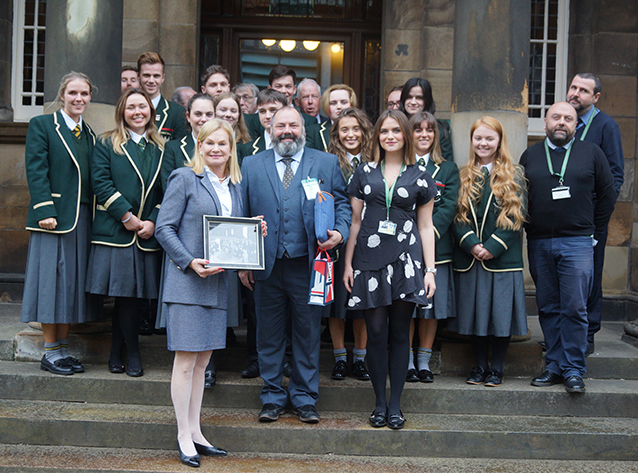News
A. J Cronin's (OA 1914) Granddaughter Visits St Aloysius' College

A. J Cronin's (OA 1914) Granddaughter Visits St Aloysius' College
Last week we welcomed Diana Cronin to the College. Diana is the Granddaughter of A.J. Cronin (OA, 1914) who was a Scottish novelist and physician and whose novel 'The Citadel' has been widely credited as the inspiration behind the launch of the National Health Service.
Miss Lapping, our Librarian, reflects on the experience.
"Last week we celebrated the life and works of a very special OA, Archibald Joseph Cronin. Even though he graduated from the college over a century ago in 1914, his impact on our culture and society has been both remarkable and enduring. He began his career as a doctor; however, the 1930’s saw him carve out a career as one of the most successful authors of his time. On Monday we welcomed Cronin’s granddaughter, Diana, to The College to share the archives we had uncovered about her grandfather and learn more about his fascinating life after leaving St Aloysius’.
S6 pupils were treated to presentations on Cronin’s literary significance by Professor Gerry Carruthers of Glasgow University (Cronin’s other alma mater) and on his life and upbringing by Dr Frank Dunn. Diana Cronin spent time with pupils and kindly presented us with a photograph of her grandparents with Pope Pius XII. On Tuesday evening, the Library and English Captains’ represented The College at a symposium at the University of Glasgow to hear more about the impact Cronin’s novels had on medical practices, literature and beyond.
One of Cronin’s best-known novels, The Citadel (1937), concerns a Scottish doctor in a Welsh mining village, who is intent on moving up the career ladder. Taking inspiration from Cronin’s real-life experiences, the book exposed the inequalities and injustice of medical practice and ethics that were prevalent in Britain at that time. In doing so, Cronin’s book was credited for bringing these issues to public consciousness and laying the foundation for the introduction of the NHS the following decade.
We are fortunate to have retained a variety of items from Cronin’s time at The College, which gives us an insight into his character and early writing skills. Cronin excelled in The College and routinely placed in the top of his class. From our archives, we can see the numerous accolades and prizes he accumulated, as well as the clubs he was involved with. In later life, many of his books were subsequently adapted into star-studded Hollywood films, TV shows and radio productions. His novels have been translated into many languages and are enjoyed worldwide to this day. But before all his fame and critical success, Cronin was a conscientious schoolboy who wrote essays about his admiration for Robert Louis Stevenson and captained the First Eleven football team on weekends.
A J Cronin embodied the ethos of The College throughout his dual career as a doctor and an author, and he has since been acknowledged for his ability to affect meaningful change for the good of others. In spite of his many accomplishments, Cronin remained humble throughout his life, stating that ‘the virtue of all achievement is victory over oneself, those who know this can never know defeat."
Miss Lapping- Librarian
